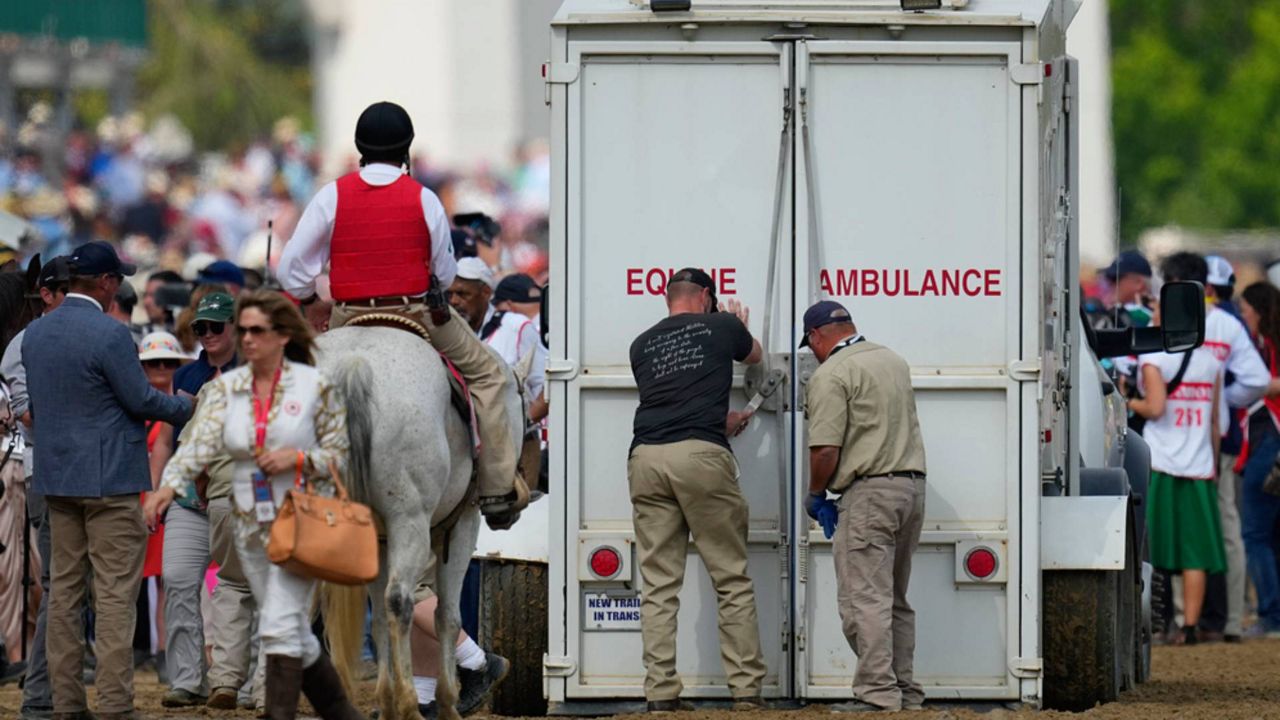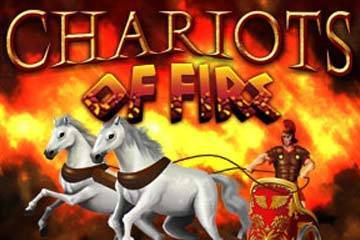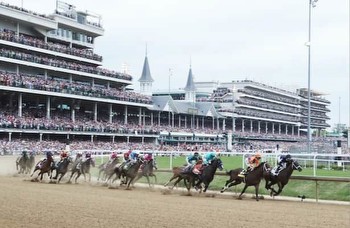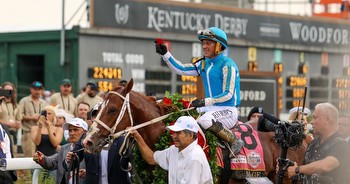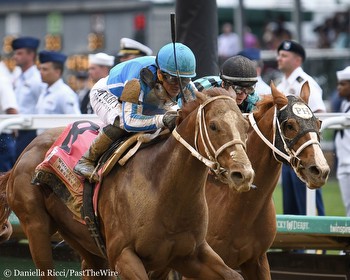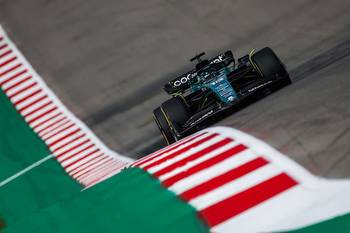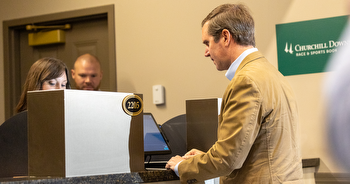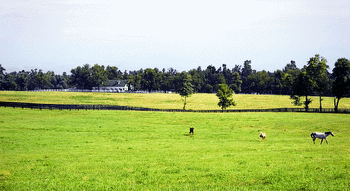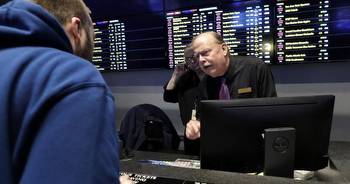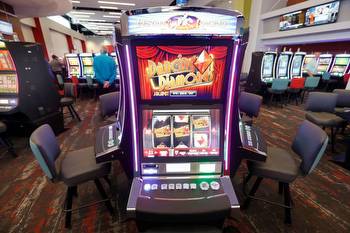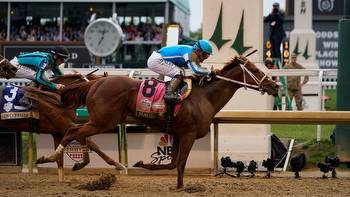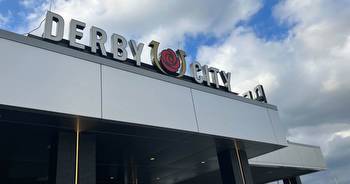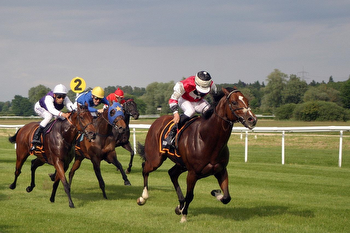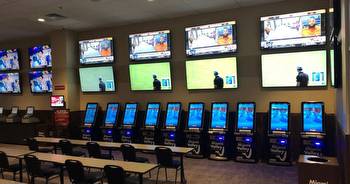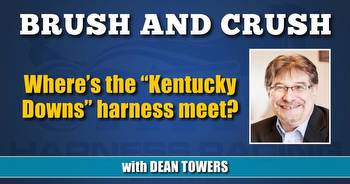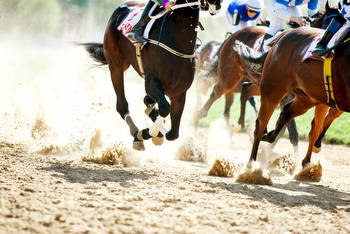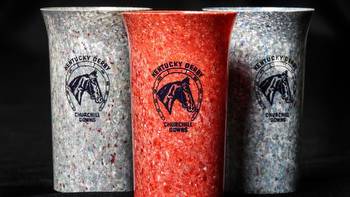Racehorse owners look to capitalize off Derby succcess
CINCINNATI — This past weekend’s Kentucky Derby once again claimed its crown as the biggest day in horse racing.
For some, Derby Day is about frilly hats, mint-infused beverages and perhaps a bet or two. But for horse owners, like Michael Annechino, they view it as an important opportunity to attract fresh eyes to the sport.
What You Need To Know
- Owners of Ohio race horses fear that legalized sports betting could undermine the future of the sport
- Only one sports-betting app also accepts wagers on horse races
- Bettors wagered $2.5 billion on sports in Ohio in the first three months after it became legal
- Owners hope to capitalize on the success of the Kentucky Derby to attrack new fans
The first leg of racing’s Triple Crown saw a record $188.7 million wagered on the 18 horses running for the roses, according to BetKentucky.com.
That money came in from gamblers at Churchill Downs, but also other horse tracks, racinos and off-track betting sites, and online sites or mobile apps.
For the day, Louisville, Ky., racetrack’s 14-race card on Saturday saw a record $288.7 million bet overall. The track also reported a record $74.9 million wagered on Friday’s card, which featured the Kentucky Oaks.
Wagering on sports became legal in Ohio on Jan. 1, 2023. (AP)
The betting action follows a trend in recent years that shows more money being injected into purses and betting. But with the emergence of sports gambling, Annechino’s fear is those numbers could run a different direction in the future.
On Jan. 1, 2023, Ohio became one of 36 states and Washington, D.C., to legalize sports betting in some capacity. Ohio and 25 other states have also legalized mobile sports betting. That number is up from 18 last year.
From January until March, bettors wagered $2.5 billion on sports in Ohio, with more than $2.4 billion being done online or via a mobile app, according to a report from the Ohio Casino Control Commission.
“There’s only so much money people have to bet,” said Annechino, executive director of the Ohio Thoroughbred Breeders and Owners Association. The group advocates on topics ranging from breeding rules and training and track conditions to the races.
“If somebody bets $10 on the Browns or the Bengals, that’s $10 less they have to bet on a horse,” he added. “Sports gambling can’t help but have at least a little negative impact on racing.”
Based in northeast Ohio, Annechino’s 15 horses race at all three thoroughbred tracks across the state, including Belterra Park, a turf course on the east side of Cincinnati.
“We knew sports betting was coming, but we felt that horse racing should have got a piece of the sports betting pie,” Annechino said.
“I’m not putting it down. It’s part of our culture now,” he continued. “I just wish there was a little bit more recognition of how they really will impact things like horse racing, and we could have gotten something from that.”
‘No consideration’ of horse racing in Ohio’s sports betting law
The push to legalize sports gambling in Ohio was led by State Sen. Kirk Schuring, District 29-Canton, and State Reps. Jay Edwards, District 94-Nelsonville, and Bill Seitz, District 30-Cincinnati. All three are Republicans.
“I am very pleased with the sports gambling rollout,” said Seitz, the House’s majority floor leader. The longtime politician specifically referenced “how much additional money the state has generated” for schools and youth athletics in just the first few months.
The Sports Gaming Profits Education Fund receives 10% of all money wagered on sports and additional money from certain licensing fees. Almost all that money goes to K-12 education and athletics and other extracurriculars. The remaining 2% goes to addressing gambling addictions.
“Ohio needed sports gambling because there is a tremendous appetite for sports gambling and because many of the states surrounding us already adopted it,” Seitz added. “There is no point in losing revenue to neighboring states.”
Seitz admitted there was no specific consideration given to horse racing in the gambling bill. He said the state’s horse tracks and horsemen already received a “very generous” chunk of casino tax revenue when the state legalized racinos in 2009.
No consideration was given to horse racing in Ohio's legislation because of a previous decision to use 3% of casino tax revenue to race purses and track operations. (File)
Racinos are horse tracks that have video lottery terminals or slot machines.
The state constitutional amendment directed 3% of all casino tax revenue to the Ohio State Racing Commission for race purses and day-to-day operations. The goal, Seitz said, was to attract “superior quality of horse” to Ohio’s eight total racetracks.
Annechino described that action by Ohio legislators as an acknowledgment that the new gambling options would take money away from the sport.
One of Annechino’s greatest fears is the potential wide-reaching effects taking money away from horse racing would have on several industries, particularly in rural communities — veterinarians, breeders, farmers, etc.
He called his sport an important part of Ohio’s economy.
“People think of horse racing and picture a bunch of old guys with cigars making bets in a dark room. That’s so not what this industry is about,” said Annechino, who bought his first horse in 1981.
“These horses have to eat. They need shoes, and vets and dentists,” he added. “And each of these horses has a mother and father who aren’t racing, so they’re living on a farm in a rural part of the state. Those farms, which pay property taxes, rely on horses for boarding or breeding as well.”
Seitz admitted that sports gambling has the potential to hurt horse racing. He said the gambling industries may “cannibalize” one another.
According to The Jockey Club, U.S. horseplayers wagered $12.1 billion in 2022. By comparison, the legal sports betting market produced a handle of $93.2 billion last year, according to the American Gaming Association.
While he’s “open to having the discussion” about better incorporating horse racing into sports gaming, he’s not sure what more the state can do. The racinos — the operators of the horse tracks — are already engaging in sports gaming through both mobile apps and their brick-and-mortar sites.
Belterra Park didn’t respond to multiple requests for comment.
“We put into the state’s budget a study commission to look at this subject in a holistic way,” Seitz said.
Drawing young eyes to a perceived ‘old guy’ sport
Lou Monaco, a gaming analyst for BetOhio.com, noted that the legalization of sports betting apps hasn’t affected in-person betting at casinos or racinos so far.
Ohio’s seven racinos combined for a record $125 million in in-person betting, up 9.4% from February.
Opening a sportsbook led to a 10-15% increase in attendance at Thistledown Racino near Cleveland earlier this winter, said Angela Matthews, a spokesperson for Jack Entertainment. The new audience is also younger than usual.
“What we’ve seen is actually a demographic we haven’t seen,” Matthews told Spectrum News in February.
Seven horses died during Kentucky Derby week at Churchill Downs. (AP)
“It’s an increase of energy and fun that not only the sportsbook area receives,” she added. “It’s the entire property.”
Even with an uptick in attendance at casinos, gambling websites and mobile apps are attracting the overwhelming majority of the action.
Monaco said the long-term hope is betting fans will sign up for an app and find horse racing. But right now, that’s not possible most times.
Jack Entertainment, for instance, has its own sports betting app, but it doesn’t allow gamblers to wager on horse races. FanDuel is the only app or online site that accepts betting on both horse racing and other sports.
Economic indicator data released by Equibase last year showed that U.S. horse racing industry recorded its largest annual wagering handle numbers since 2009. But that occurred over 30% fewer races overall. The average number of horses per race also dropped from 7.94 to 7.37.
Horse racing in Ohio hasn’t felt “any real pinch” on purses or anything along those lines, Annechino said, because of existing contracts. But he expects it to happen soon if people do less in-person gambling.
Branding has been a major issue for horse racing in recent years, Annechino said. Well-publicized scandals and perceived safety issues have marred its reputation as well. Over the course of the weekend, seven horses had to be put down at Churchill Downs because of injuries.
Those incidents are “heartbreaking” and often the result of a “few bad actors” skirting established rules and regulations, Annechino said. He described each of his horses as a part of his family.
Another issue is the perception of betting on horses as the “old guy’s way of gambling,” Monaco said. But people of all backgrounds — male and female — always gear up for the Kentucky Derby and other big events, such as the Breeders’ Cup.
The several hours of national TV coverage those events receive doesn’t hurt.
“The key is: Can the sport keep these fans and bettors for the third race at Churchill Downs on a Tuesday afternoon?” he said. “That has always been a work in progress.”
One of those people the horse racing world hopes to attract is John, a Cincinnati resident, and a frequent sports gambler. Spectrum News Ohio agreed not to use John’s last name because he didn’t want an association with gambling.
John didn’t grow up around the sport, so it “wasn’t even an afterthought” when he became old enough to place a bet. Now in his mid 30s, John first dabbled in it five or six years ago when he discovered a site where he could watch simulcasts and bet online.
“It was about accessibility,” he said.
Since Jan. 1, John hadn’t bet on a race until this weekend. He put money on several horses on Saturday, including some in races held places other than Churchill Downs. The wait time between races in Louisville was too much, he joked.
He placed $20 to win on Angel of Empire, the betting-line favorite at 9-2 odds. The 2-year-old finished third behind Mage and Two Phil’s.
John doesn’t envision himself betting on any other horse races this year apart from the other two leagues of the Triple Crown — the Preakness Stakes and the Belmont Stakes — if there’s a good storyline.
“I now can bet on nearly any sport across the world, and they’re sports I actually like to watch, know a little about, and can make some more informed bets about,” he said.
It’s vital for horse tracks to parlay the popularity of the Kentucky Derby and other major races into new fans of the sport, Monaco said.
Both Belterra and Turfway Park Racing and Gaming in Florence, Ky., had special events for Kentucky Derby weekend. Sports betting in Kentucky will go live later this year.
Chip Bach is the general manager of Turfway, owned by Churchill Downs. There were a lot of “novices” to horse racing in the grandstand and on the grounds over the weekend, he said. His customer service team taught people how to place a bet and the different wagering options.
Turfway’s live-racing season doesn’t start until December. But the team tried to capitalize on the pageantry of Derby Day to get people to the track, Bach said.
Annechino it’s going to take a lot of work to get to horse racing back to its position as the Sport of Kings. But he hopes the fun on Saturday left a lasting mark on some first-timers.
“We had a bunch of new eyeballs looking at our sport this weekend,” he said. “Hopefully, one or two of them are going to ask, ‘That was pretty cool. How do I get involved?’”
